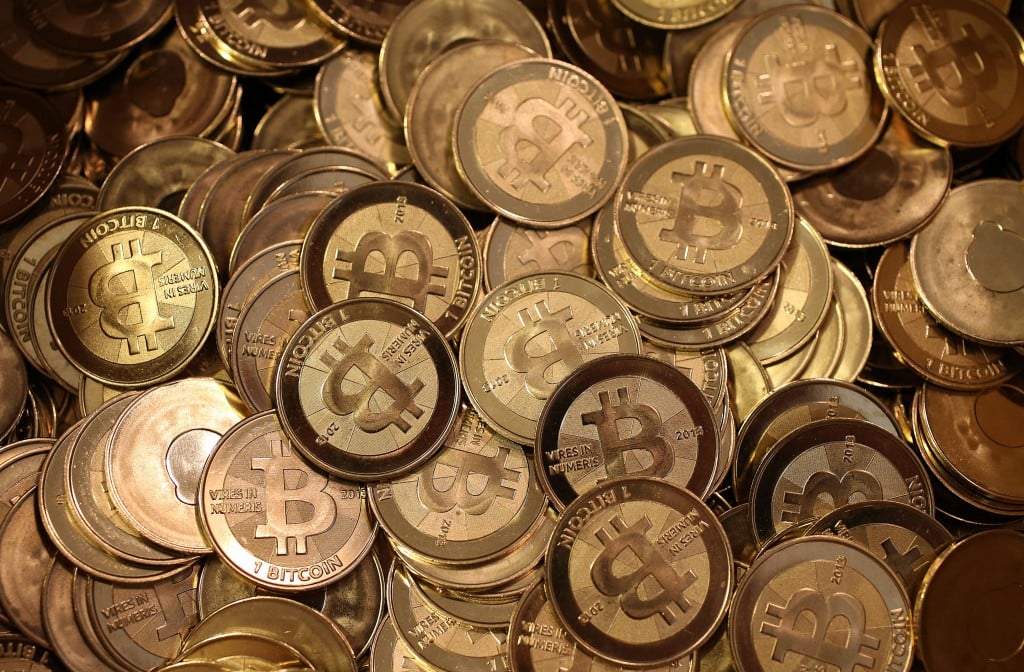Bitcoin & Exchanges – A Quick Primer

A pile of Bitcoin. Credit: George Frey/Getty Images
What is Bitcoin?
Bitcoin. What is it? Bitcoin (known as BTC or XBT) is a decentralized, completely peer-to-peer, digital asset (some say currency, some say commodity) based on open source software that runs on millions of computers all around the globe. Being decentralized, there is no organization, bank, or government that controls Bitcoin. Any internet-connected computer in the world that runs the Bitcoin software becomes part of the decentralized Bitcoin network. These computers are racing each other to complete complex mathematical problems that confirm Bitcoin transactions and secure the Bitcoin network. The reward for confirming a “block” of transactions is a batch of Bitcoins that have never been in circulation before – this is a process known as “mining Bitcoin” and it’s how new Bitcoins are made.
Why use – or even care about – Bitcoin?
Bitcoin is an amazing breakthrough in computer technology, that is why it was originally adopted by “nerds.” Bitcoin is a global currency/commodity/asset (depending on who you ask) but the important thing is that no matter where you are in the world, 1.0 BTC = 1.0 BTC. Because the Bitcoin network itself takes care of processing transactions and keeping track of “account” balances, there is no need for financial middlemen! It literally cuts banks and payment processors out of the equation while at the same time enabling instant peer-to-peer money transmission over the internet for a flat fee of 0.0001 BTC per transaction, the equivalent of about $0.05. It makes sending money as easy as sending an email.
Think about how much merchants would save if they didn’t have to pay credit card processing fees; how much a person working abroad would save when s/he sends money back home to their family if they didn’t have to pay foreign exchange and international money transfer fees. And because Bitcoin is entirely digital, there is no need for a bank to hold on to your physical cash. You can literally hold $1,000,000 in your pocket (although that isn’t suggested)!
But is it unregulated?
Bitcoin is regulated by the source code of the Bitcoin software. The code determines the rate at which new Bitcoins are released and the total amount of Bitcoins that can ever be released (sort of the way a Central Bank would institute monetary policy). The only way the Bitcoin source code can be changed is if a majority of the Bitcoin network agrees on changes. Most of the large Bitcoin exchanges – e.g. Bitfinex, Bitstamp, BTC-e, Huobi, OKCoin – and popular Bitcoin brokers – e.g. Coinbase, Circle, Expresscoin – follow standard AML/KYC regulations for money transmitters in the jurisdictions they reside in. But technically Bitcoin exchanges are unregulated. Governments haven’t decided – or rather declared –whether they should be subject to the same rules as “traditional” exchanges or if they count as money transmitters or if they are banks… You get the idea. It isn’t illegal to run a Bitcoin exchange, but the government has not declared the set of rules for them either.
Leading the way in Bitcoin regulation is New York and the New York State Department of Financial Services. They have proposed a “BitLicense,” a specific set of regulations specifically pertaining to businesses dealing with Bitcoin and other digital currencies. The NYDFS is about to release their second draft of the regulations, and a final version is due out at the end of the year. While the Bitcoin community has very mixed feelings about the BitLicense, there is no doubt that once clear regulation has been laid out there will be a flood of Bitcoin exchanges opening in New York. “Regulators must be very careful because any undue friction caused by overbearing regulation in one jurisdiction will cause Bitcoin companies to simply move to another jurisdiction that is friendlier to this burgeoning new industry,” says Austin Alexander of the Bitcoin Center NYC. Once Bitcoin exchanges are regulated and subject to strict rules, they will be competing on how well they facilitate their customers’ trades and meet other requirements, not how trust worthy they are.
For more information, please contact us or visit: www.etnasoft.com for industry news and company updates.
Stay social with ETNA
Facebook Twitter LinkedIn YouTube